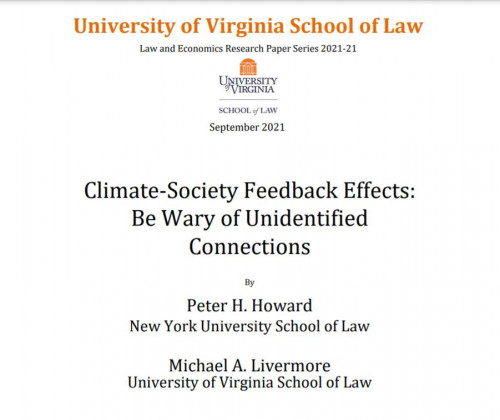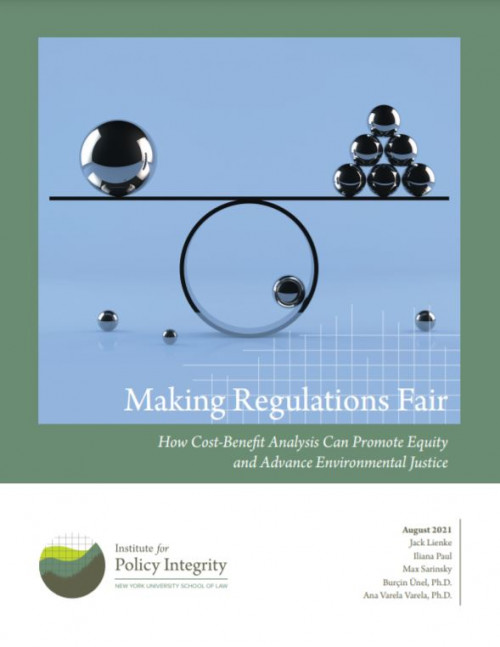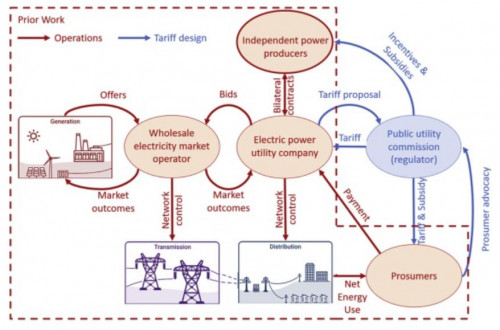-
Climate-Society Feedback Effects
Be Wary of Unidentified Connections
To ensure policies are based on accurate predictions of climate impacts, it is critical to understand social-ecological system (SES) feedbacks, including how humans change the climate by reacting to a changing climate. Building on recent scholarly work on the topic, this article describes SES interactions and how they can be incorporated into climate policy tools such as the social cost of carbon. The article then proposes a research agenda for the identification, quantification, and integration of climate-society feedbacks into social-cost integrated assessment models (SC-IAMs).
-
Comments to EPA and USACE on Clean Water Protections
The Environmental Protection Agency (EPA) and Army Corps of Engineers (USACE) have expressed the intention to repeal the Navigable Waters Protection Rule, which removed critical federal protections on many waterways and has been vacated by a federal court for violating the Clean Water Act. In comments filed to the agencies, we welcome the decision to replace the rule but encourage strong justification for reversing course and point to flaws in the economic analysis for the earlier rule that can support the case for replacing it.
We previously commented on the rule and its flawed economic justification, published a report on its concealed costs, and filed amicus briefs in court cases that challenged it.
-
Making Regulations Fair
How Cost-Benefit Analysis Can Promote Equity and Advance Environmental Justice
To achieve the Biden administration’s ambitious commitments to equity and environmental justice, agencies will need guidance on how to assess and weigh the distributional effects of policy options. This report recommends steps that the Office of Management and Budget (OMB) can take to mainstream equity into agencies’ decisionmaking.
-
Comments to FERC on the North Baja Xpress Project
The North Baja XPress Project would provide a significant increase in natural gas compression and transportation, potentially resulting in 9.5 million metric tons or more in downstream greenhouse gas emissions. The Federal Energy Regulatory Commission, however, failed to estimate the project’s total emissions and climate damages. In October 2020, we submitted comments recommending that FERC consider the full range of upstream and downstream emissions and contextualize their impacts using the social cost of carbon.
In our August 2021 follow up letter responding to FERC's draft environmental impact statement for the project, we note that the Commission has taken the helpful steps of quantifying direct and downstream emissions, but should still quantify upstream emissions, assess the project's incremental environmental harms, and consider avenues to mitigate emissions.
-
Comments to FERC on East 300 Upgrade Project
The East 300 Upgrade Project could result in the emission of over 2.3 million tons of downstream emissions in carbon-dioxide equivalence per year from the combusion of natural gas. In March, we submitted comments encouraging the Federal Energy Regulatory Commission to provide a more complete analysis of project emissions and weigh its climate impacts using the social cost of carbon. In August, we followed up with a comment letter regarding the Commission's continued failures to meaningfully assess climate impacts in the project's Draft Environmental Impact Statement.
-
Comments to FERC on PJM MOPR Reform
We submitted comments to the Federal Energy Regulatory Commission (FERC) encouraging the agency to accept PJM’s proposed changes to the Minimum Offer Price Rule, which recognizes that generation-based externality payment for clean electricity resources can be welfare-enhancing, and removes the artificial barrier to market entry for resources that receive payments under state climate policies created by the previous rule.
-
Modeling Strategic Objectives and Behavior in the Transition of the Energy Sector to Inform Policymaking
in The Electricity Journal
The typical starting point and centerpiece of energy decarbonization is the electric power sector, a large direct GHG emitter. Published in The Electricity Journal, this paper explores what the modeling community should do to inform this transition, including expanding energy market datasets and designing models that incorporate multiple objectives and manifold actors behaving strategically in a framework consisting of large uncertainty, while accounting for the physics of power systems.
-
Comments to FERC on the East Lateral XPress Project
The East Lateral XPress Project could result in the emission of over 3.6 million tons of downstream emissions in carbon-dioxide equivalence per year from the combustion of natural gas. We submitted comments (April 2021) and a follow-up letter (August 2021) encouraging the Federal Energy Regulatory Commission to provide a more complete analysis of project emissions, weigh its climate impacts using the social cost of carbon, and consider mitigation measures.
-
Comments to ONRR on Its New Proposal to Rescind Trump-Era Valuation Rule Repeal
In June 2021, the Department of the Interior’s Office of Natural Resource Revenue's (ONRR) proposed a rule rescinding a Trump-era repeal of the Valuation Rule. This rule sought to ensure that states and the federal government receive the full value of royalties due under the law for oil, gas, and coal extracted from public land. We submitted comments supporting ONRR’s proposal to fully rescind the 2020 Rule and encourage ONRR to further elaborate upon its reasons for fully withdrawing the 2020 Rule, in contrast to other alternatives. We lay out several key provisions in the 2020 Rule where ONRR can expand upon its justification for rescinding.
This comment letter follows a long line of advocacy that we've made opposing the Trump-era rule and supporting the valuation processes that it rescinded.
-
Comments to FERC on Marcus Hook Project
The Federal Energy Regulatory Commission has granted the Marcus Hook Compression Project Limited Notice to Proceed with the first phase of construction activities, which is currently underway. Our recent comments on FERC's draft environmental impact statement for the project recommend that the agency improve its consideration of climate impacts. It can do so by quantifying upstream emissions, assessing the project’s incremental climate harms, and considering avenues to mitigate its greenhouse gas contributions.






